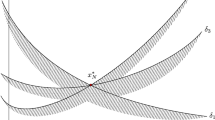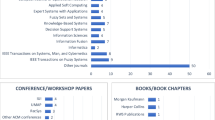Abstract
A Sophisticated Social Welfare Function (SSWF) is a mapping from profiles of individual preferences into a sophisticated preference which is a pairwise weighted comparison of alternatives. We characterize Pareto optimal and pairwise independent SSWFs in terms of oligarchies that are induced by some power distribution in the society. This is a fairly large class ranging from dictatoriality to anonymous aggregation rules. Our results generalize the impossibility theorem of Arrow (Social choice and individual values. Wiley, New York, 1951) and the oligarchy theorem of Gibbard (Intransitive social indifference and the Arrow dilemma, University of Chicago, unpublished manuscript, 1969).
Similar content being viewed by others
References
Arrow K (1951) Social choice and individual values. Wiley, New York
Arrow K (1963) Social choice and individual values, 2nd edn. Wiley, New York
Bandyopadhyay T, Deb R, Pattanaik PK (1982) The structure of coalitional power under probabilistic group decision rules. J Econ Theory 27: 366–375
Banerjee A (1994) Fuzzy preferences and Arrow-type problems in social choice. Soc Choice Welfare 11: 121–130
Barberà S, Sonnenschein H (1978) Preference aggregation with randomized social orderings. J Econ Theory 18: 244–254
Barberà S, Valenciano F (1983) Collective probabilistic judgements. Econometrica 51(4): 1033–1046
Barrett R, Pattanaik PK, Salles M (1986) On the structure of fuzzy social welfare functions. Fuzzy Sets Syst 19: 1–10
Barrett R, Salles M (2005) Social choice with fuzzy preferences (unpublished manuscript)
Dasgupta M, Deb R (1996) Transitivity and fuzzy preferences. Soc Choice Welfare 13: 305–318
Dubois D, Prade H (1980) Fuzzy sets and systems: theory and applications. Academic Press, New York
Dutta B (1987) Fuzzy preferences and social choice. Math Soc Sci 13: 215–229
Fishburn PC (1998) Stochastic utility. In: Barberà S, Hammond PJ, Seidl C (eds) Handbook of utility theory, vol I. Kluwer, Dordrecht
Gibbard AF (1969) Intransitive social indifference and the Arrow dilemma, University of Chicago (unpublished manuscript)
McLennan A (1980) Randomized preference aggregation: additivity of power and strategy-proofness. J Econ Theory 22: 1–11
Nandeibam S (2003) A reexamination of additivity of power in randomized social preference. Rev Econ Des 8: 293–299
Author information
Authors and Affiliations
Corresponding author
Additional information
This paper is part of a project entitled “Social Perception—A Social Choice Perspective”, supported by Istanbul Bilgi University Research Fund. We extensively benefited from our discussions with Salvador Barberà, Herve Moulin and William Zwicker. We also thank Fuad Aleskerov, Sergei Artemov, Goksel Asan, Burak Can, Murat Ali Cengelci, Gabrielle Demange, Bora Erdamar, Doruk Iris, Ozgur Kibris, Semih Koray, Ipek Ozkal-Sanver, Rohit Parikh, Maurice Salles, Norman Schofield and an anonymous referee for their valuable contributions at various occasions. Last but not the least, Remzi Sanver acknowledges the support of the Turkish Academy of Sciences Distinguished Young Scientist Award Program (TUBA-GEBIP).
Rights and permissions
About this article
Cite this article
Sanver, M.R., Selçuk, Ö. Sophisticated preference aggregation. Soc Choice Welf 33, 73–86 (2009). https://doi.org/10.1007/s00355-008-0346-4
Received:
Accepted:
Published:
Issue Date:
DOI: https://doi.org/10.1007/s00355-008-0346-4




